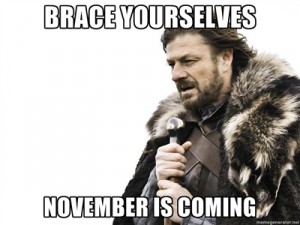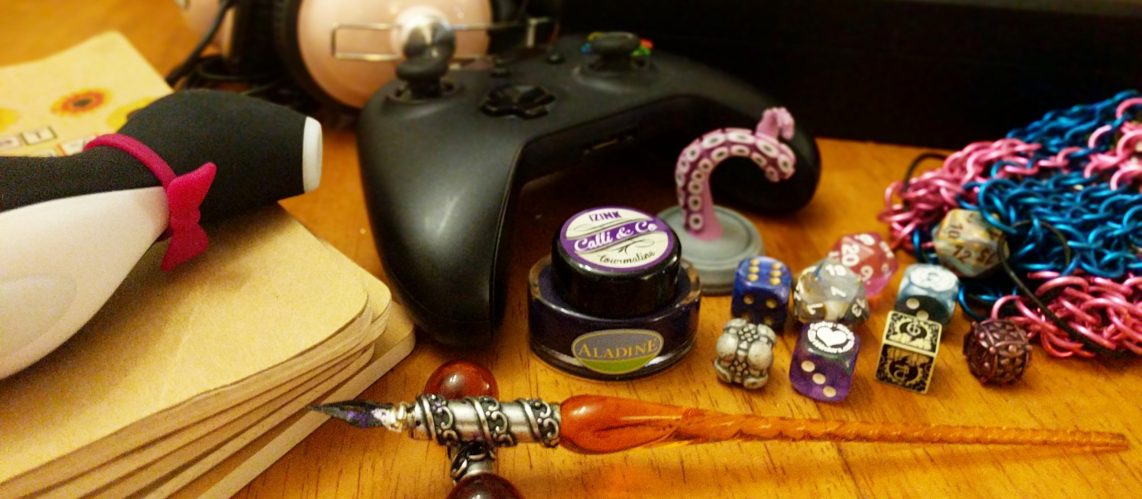 It’s almost November, and around here, November means National Novel Writing Month. The month hasn’t snuck up on me this time; rather, it’s loomed slowly out of the shadows like a great hulking beast, and I’ve watched it come with what may seem, to others, like an inappropriate lack of fear. We’re exactly one week out from launch day, and forums and blogs alike are littered with anxiety-filled pre-nano posts.
It’s almost November, and around here, November means National Novel Writing Month. The month hasn’t snuck up on me this time; rather, it’s loomed slowly out of the shadows like a great hulking beast, and I’ve watched it come with what may seem, to others, like an inappropriate lack of fear. We’re exactly one week out from launch day, and forums and blogs alike are littered with anxiety-filled pre-nano posts.
You don’t need to have this much anxiety. A healthy dose is all right: you’re attempting a new challenge! Challenges are challenging! But if you’re beginning to break out in cold sweats, or the apprehension is becoming fear, I hope these next few posts can help.
A Caveat
Before we begin, though, figure out if you really want to win. This seems silly, right? Of course you want to win… or do you? Have you already decided it’s not possible? Have you found yourself saying, “Well, it’s all right if I don’t win, because I’ll still have written more than ever before…” or “I probably won’t win,” and meaning it? Are you saying these things because you really feel that way, or because the thought of “failure” is crippling?
It’s okay to not “win.” It’s okay to not even want to win, but just to enjoy participating. You will have written more than ever before. No one will think less of you for the attempt.
It’s also okay to really, really want to win, and throw your clichéd hat over the wall in the attempt.
This post is written to those of you who really want to win. The rest can hopefully glean some important tidbits in here as well, but if you find there’s an inordinate amount of focus on winning, it’s because that’s how I roll, yo.
So, without further ado, here is a compiled list of Nano wisdom, gleaned from 11 years of participation and winning. I’ll be putting these out over the next few days.
General Tips
- Decide to win. Many Week 3 crises occur because people just haven’t fully dedicated themselves to winning. They want to win but are afraid to commit. They’re worried that if they really try, if they really, really put themselves out there and fail, they won’t have a fallback. They can’t say, “Oh, well, I wasn’t really trying.” It doesn’t make you a bad person if you try and fail. It’s far more noble to try. Go all Don Quixote on yourself if you want. Decide right away that you’re going to win, and then spend the rest of the month just managing that decision.
- Write every day. If you miss a day, don’t miss the next day. Your novel is like a puppy: it needs constant attention and focus. If you neglect it, it will eat all your shoes. Sometimes you’ll miss a day, but make sure you write the next day. The longer you stay away from your novel, the harder it is to start again.
- Don’t stop at the end of a chapter or scene. Even if I’m approaching a natural stopping place in my novel, I end the scene, then hit enter a few times and write at least the first few sentences of the next scene. That way, when I pick it up again, I know where I’m going.
- Kick-start the day. Try to write a few hundred words first thing in the morning before doing anything else. Like going to the gym in the morning, it really sets up your day for success. It also brings down your total word count needed for the day to something more manageable.
- Police your distractions. My husband likes to keep the television on for background noise in the evenings, and I can’t write when it’s on. I also can’t write to music with lyrics. Knowing these things about myself, I have a whole Pandora station set up to orchestral music so I can tune out the world and write. I also try to stay off the internet until I’ve done my daily word count.
- Don’t let anyone read your work in progress. I can only make it through November by telling myself that no one will ever, ever, ever read this novel, and that it’s just for me. The moment I start imagining my audience’s reaction to the horrible tripe that is my First Draft, I get paralyzed with fear. “But… but… but I want positive feedback!” you say. Well, tough. As soon as you start to get positive feedback, you start to WANT positive feedback, and the first hints of “well, maybe you should do this instead…” will crush your soul and derail your creativity. Maybe that’s hyperbole, maybe not, but I recommend you hold off getting feedback until you’re ready for, you know, feedback.Which should not be on your in-progress first draft.
That’s all for now. Next time: planning tips! I’ll try to get them out with a few days’ notice, so they’re actually… useful. (No, you don’t need a month to plan. You can do it in just a few days, really.)
